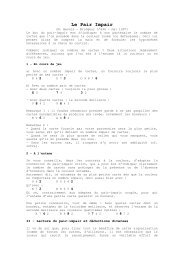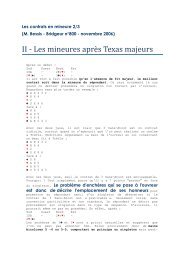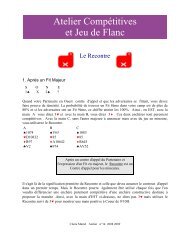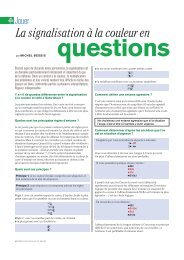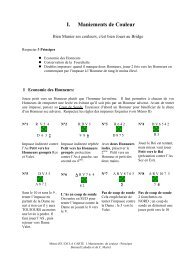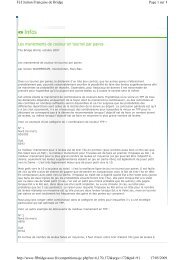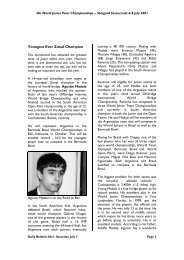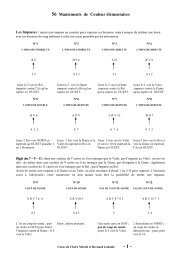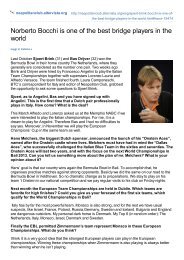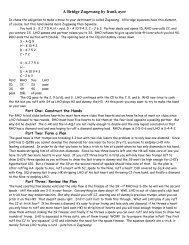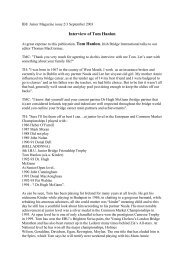Create successful ePaper yourself
Turn your PDF publications into a flip-book with our unique Google optimized e-Paper software.
Scorecard, May/June, 2005, Page 13<br />
<strong>Gary</strong> <strong>King</strong><br />
<strong>Mentoring</strong><br />
In bridge, as in life, there are generally good and bad aspects about any subject you choose. The<br />
subject of this column is mentoring. <strong>Mentoring</strong> is a process through which a player of greater<br />
experience takes on the teaching role for a player with lesser experience. Many players live in<br />
areas that have active and organized mentoring programs. In other areas mentoring is kind of a hit<br />
or miss thing that often just occurs when a more experienced player decides to take on the task of<br />
“passing on the wisdom” that he or she has gained over the years. In broad terms mentoring is a<br />
good thing. I think that anyone that gives of their time to the benefit of others should be<br />
applauded. If you are reading this and you are a player that has a mentor I think you should cut it<br />
out and make sure your mentor gets a copy. You can do it personally or anonymously, that is up<br />
to you. If you are reading this and you perform as a mentor to a lesser experienced player then<br />
please read on and think about my suggestions.I have taught a fair number of students over the<br />
years and I haveheard many stories about what they have been told about this game we love.What<br />
I would like to achieve is to improve your results so that the time you invest is better spent and<br />
the outcome is a valuable one for your student and for the game as a whole. As a mentor, what is<br />
your job when you play with your protégé? If you answered that is it to win the game or event, I<br />
would submit that your priorities are wrong. I think your job is to provide a solid and steady<br />
platform <strong>by</strong> which your student can learn. You are not a professional bridge player. Your job is<br />
not to win. Your job is to instruct. At times, the required attitude can be difficult or even contrary<br />
to your natural instincts. Everyone wants to win, that is just normal. But when you are playing<br />
with a student your job is to play your side of table and let partner play theirs.<br />
First Rule: Always make the proper bid and resist the temptation to “take charge.”<br />
If you have every just leaped to game or slam instead of making the correct bid, then you are not<br />
helping.<br />
xxx<br />
AKxx<br />
RV<br />
D10xx<br />
Partner You<br />
1D 1H<br />
2C ???<br />
Bidding 3NT is not right, and you know it. “But partner won’t know what to do if I bid 2S!” you<br />
cry. Maybe he or she won’t know what 2S means and will do the wrong thing. Need I<br />
point out, that is why you are there? You should bid 2S and let the chips fall where they may. If<br />
partner does that right thing over 2S then you should note it and give positive reinforcement. If<br />
partner looks quizzical and leaps to 4S getting you to a 3-3 fit, then you look upon this as a<br />
learning opportunity to discuss (later, of course, not at the table) responder’s job and<br />
the use of fourth suit forcing.<br />
Second Rule: Be careful with your descriptions when discussing any element of the game. Please<br />
just remove the words “always” and “never” from your vocabulary. I cannot tell you how many<br />
students have ask a question, “I was playing with Billy Bob last weekend and he told me that I<br />
should ALWAYS return the opening lead.” Think about what you are saying. It is much betterto<br />
patiently explain that returning partner’s opening lead is frequently or often the correct defense,<br />
but that there is no substitute for thinking and considering all the possibilities before deciding
what to do. You didn’t really mean always, so please do not say so. Students respect your opinion<br />
and will take your advice to heart. Be careful with your words.<br />
Third Rule: Do not feel compelled to point out or discuss every error on any hand or during any<br />
session. Pointing out every mistake just works to demoralize your partner. Pick three or four<br />
things at most to discuss after the game (or after the hand if you must). A case in point:<br />
You<br />
x<br />
AKJxx<br />
QJxx<br />
Kxx<br />
Partner<br />
Axxx<br />
Q<br />
Kx<br />
AQxxxx<br />
You Partner<br />
1H 1S<br />
2D 3NT<br />
Pass<br />
The opening lead is a spade which partner ducks. The defenders continue spade and partner<br />
ducks again. The opponents now cash the diamond ace and lead another diamond. Partner<br />
manages to come home with the rest of the tricks, making 630.<br />
You have so many choices...<br />
(1) With a game going hand bid the suits naturally <strong>by</strong> starting with the longest<br />
(2C as an initial response).<br />
(2) With two suited hands you should strive to explore both suits and the value of a trump fit.<br />
(3) Hand evaluation and pointing out the unused bidding space between 2D and 3NT.<br />
(4) The proper use of the hold-up play.<br />
(5) Counting tricks and making a plan for the play.<br />
(6) Suit breaks and the fact that hearts<br />
are >50% to produce five tricks. (7) The proper slam is 6C and your partnership never even bid<br />
the suit. Should you discuss all of these with partner? Not a chance. Pick ONE and<br />
talk about it. Let the others go. It is of little value to try to correct all the issues. Work on<br />
whichever you feel is important. If bidding has already come up on a previous hand, then pick<br />
one of the play issues.<br />
As a mentor your best results will come from a slow and methodical process, one of continuous<br />
improvement. Don’t try to make a super star of your partner over night.<br />
A number of 35% games early on will produce better and more consistent<br />
results in the long-term. In closing, thank you for taking the<br />
time. Make it as effective as possible.




